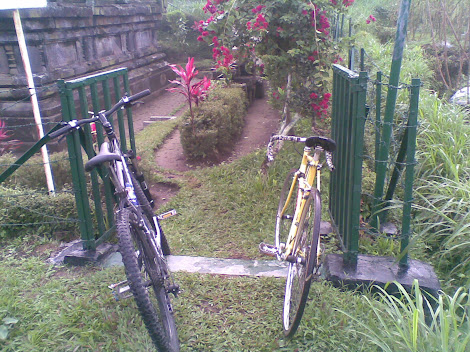This time try to review on mountain bike parts, many of us have long been riding a mountain bike (MTB), but not knowing the components or parts of the bike you are taking.
With Tips and Tricks Zonasepeda this time we expected to find more in-depth critical parts of our bikes with the goal if there is a problem on one of the components that we can know with detail the cause and maybe even improve it.MTB mountain bike anatomy
MTB mountain bike anatomy
Handle BarsBetter known by the steering handlebar, in MTB have some type of Monkey Bar, Rise bar and standard bar. Handle Bar is the cockpit of our bikes, gear control transmission, front-rear brake on the handlebar was there. Select a handle bar that suits your needs.
Top TubeIt is part of a bicycle frame top, Tip: Adjust the size of the frame with your body
Down TubeIt is part of a bicycle frame, melitang from the headset is connected directly to the top Tube Seat, Stay and House BB (buttom Bracket)
ShifterGrupsets (component) transmission gear shifting, serves to drive the FD (front therear derailleur) and RD (rear therear derailleur), Shifter in the market for the propulsion RD achieve 90-10 speed, for Shifter FD usually consists only 2-3 speed.
HandgripIs the wrapping Handlebar (handlebar steering) made from rubber / tape depending on needs. Try handgrip on the handlebar does not turn when we drive, lever that is too thick or too thin, reduce our comfort in cycling.
Brake LeverBrake levers (front-rear) Brake positioned correctly laver kenyamaan adjust with you when biking, keep your fingers can easily reach the liver (a lever).
HeadsetThe front of the frame in which there are bearings and other components used to connect Fork (suspension) front with a stem and handlebar.
StemIs part of our bicycle cockpit, serves to connect the handle bars - Headset and Fork (suspension) front. Stem is available in several sizes for the front suspension a long (long travel) stem form is different from the standard stem, Tip: if you feel your stem is too long and we seem bent cycling you can replace it with a short stem size.
SadleSaddle - the driver's seat, to bicycle MTB size is usually much thicker than the roadbike. Set Saddle position so perfectly straight (horizontal), set forward and pullback Sandel try not too far or too close to hadle bar.Tip: Position will lead to inappropriate kitika uncomfortable cycling in serious cases result in injury waist.
SeatPostSaddle holder (sadle) liaison between the saddle with a bicycle frame, adjust the vertical position with your comfort. Tip: Try riding a bike at the stop position, straighten your legs until benar2 reach the pedals. If your feet are still seen and felt still was not straight when the pedal position is below this is a sign that your seatpost is not high enough. Arrange seatpost to really fit your needs.
Seat StayRepresents the rear frame. For a dual suspension MTB Seat Stay usually swingarms (swing arm) connected to the frame using a suspension rear.
PedalsStrokes. Is a component of the Bracket and Crankset play buttom so that bikes can move (movable when we pedaled a bicycle).
Crank SetComponents pedals with connecting arm chainrings.
Chain RingIs the transmission component of the front teeth (usually consisting of 2 -3 Chain Rings). Serves to connect the chain with Crankset.
ChainChain. Is a vital component of its function because it is in charge of connecting the components Crankset Chain Ring with rear wheels, so the bike can be rode.
Idler PulleyRear part of therear derailleur (RD), a gear (teeth) with small tension (usually a per-spring) which serves to chain (chain) tetep straight and not loose.
Front therear derailleurIs a vital component in MTB bike, front tooth removal function set (chain rings). Better known as FD, is connected directly with the Shifter.
Rear therear derailleurIs a vital component in MTB bike, set the transfer function back teeth. Better known as RD, is connected directly with the Shifter.
RimsWheelset component (wheel) is more in doubt familiar with (rim) bike.
TireTires. Made of rubber, Tip: adjust your tire size and type with your needs. Tire size for the type of pavement (road) is usually a small footprint and standard motifs. For someone like offroad or even choose the type of downhill tires with special tread pattern full width and offroad.
Front ForkFront suspension, is part of a bicycle that serves to connect the wheel (whellset) front wheel (handlebar). Fork on the market available various types, brands and sizes. Tip: adjust the type and size of the fork with your needs, to use the asphalt field with a long travel fork standard, while for fans of downhill usually use a long travel.
Master DishbrakeBrake component (brake), is home to brake. This component serves to clamp dishbrake when we do the braking.For conventional Brake type (V-brake) there is no function of this component is replaced by brakepad.
DishBrakeDiscs, a disc wheelset is connected directly to either the front or rear. For this type of V-brake this component does not exist.
SpokesWheel radius, connecting the hub with rims (obviously).
HubLocated in the middle is where the radius of the wheels and rims (obviously) connected. Components in which there bearing (buckshot).
So simple tips to know the anatomy of mountain bike from zonasepeda.com, armed with this we are becoming more knowing the various components that exist on our mountain bikes
Wednesday, September 22, 2010
Subscribe to:
Post Comments (Atom)
.jpg)



No comments:
Post a Comment